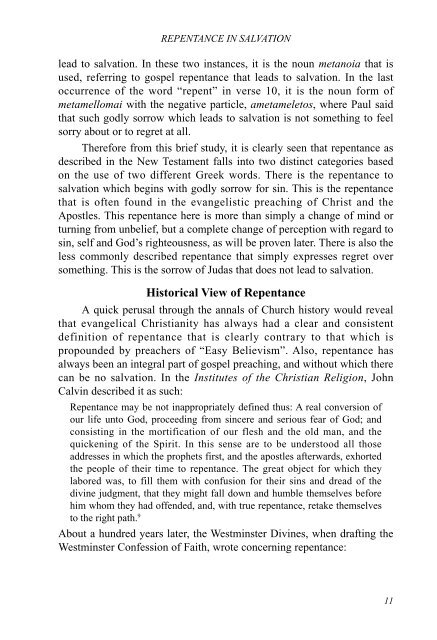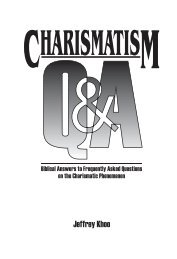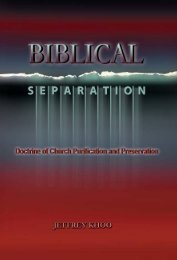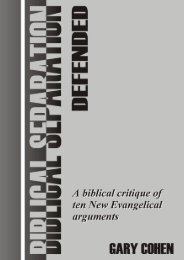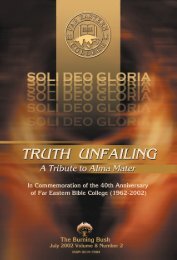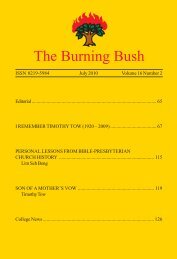The Burning Bush - Far Eastern Bible College
The Burning Bush - Far Eastern Bible College
The Burning Bush - Far Eastern Bible College
You also want an ePaper? Increase the reach of your titles
YUMPU automatically turns print PDFs into web optimized ePapers that Google loves.
REPENTANCE IN SALVATIONlead to salvation. In these two instances, it is the noun metanoia that isused, referring to gospel repentance that leads to salvation. In the lastoccurrence of the word “repent” in verse 10, it is the noun form ofmetamellomai with the negative particle, ametameletos, where Paul saidthat such godly sorrow which leads to salvation is not something to feelsorry about or to regret at all.<strong>The</strong>refore from this brief study, it is clearly seen that repentance asdescribed in the New Testament falls into two distinct categories basedon the use of two different Greek words. <strong>The</strong>re is the repentance tosalvation which begins with godly sorrow for sin. This is the repentancethat is often found in the evangelistic preaching of Christ and theApostles. This repentance here is more than simply a change of mind orturning from unbelief, but a complete change of perception with regard tosin, self and God’s righteousness, as will be proven later. <strong>The</strong>re is also theless commonly described repentance that simply expresses regret oversomething. This is the sorrow of Judas that does not lead to salvation.Historical View of RepentanceA quick perusal through the annals of Church history would revealthat evangelical Christianity has always had a clear and consistentdefinition of repentance that is clearly contrary to that which ispropounded by preachers of “Easy Believism”. Also, repentance hasalways been an integral part of gospel preaching, and without which therecan be no salvation. In the Institutes of the Christian Religion, JohnCalvin described it as such:Repentance may be not inappropriately defined thus: A real conversion ofour life unto God, proceeding from sincere and serious fear of God; andconsisting in the mortification of our flesh and the old man, and thequickening of the Spirit. In this sense are to be understood all thoseaddresses in which the prophets first, and the apostles afterwards, exhortedthe people of their time to repentance. <strong>The</strong> great object for which theylabored was, to fill them with confusion for their sins and dread of thedivine judgment, that they might fall down and humble themselves beforehim whom they had offended, and, with true repentance, retake themselvesto the right path. 9About a hundred years later, the Westminster Divines, when drafting theWestminster Confession of Faith, wrote concerning repentance:11


